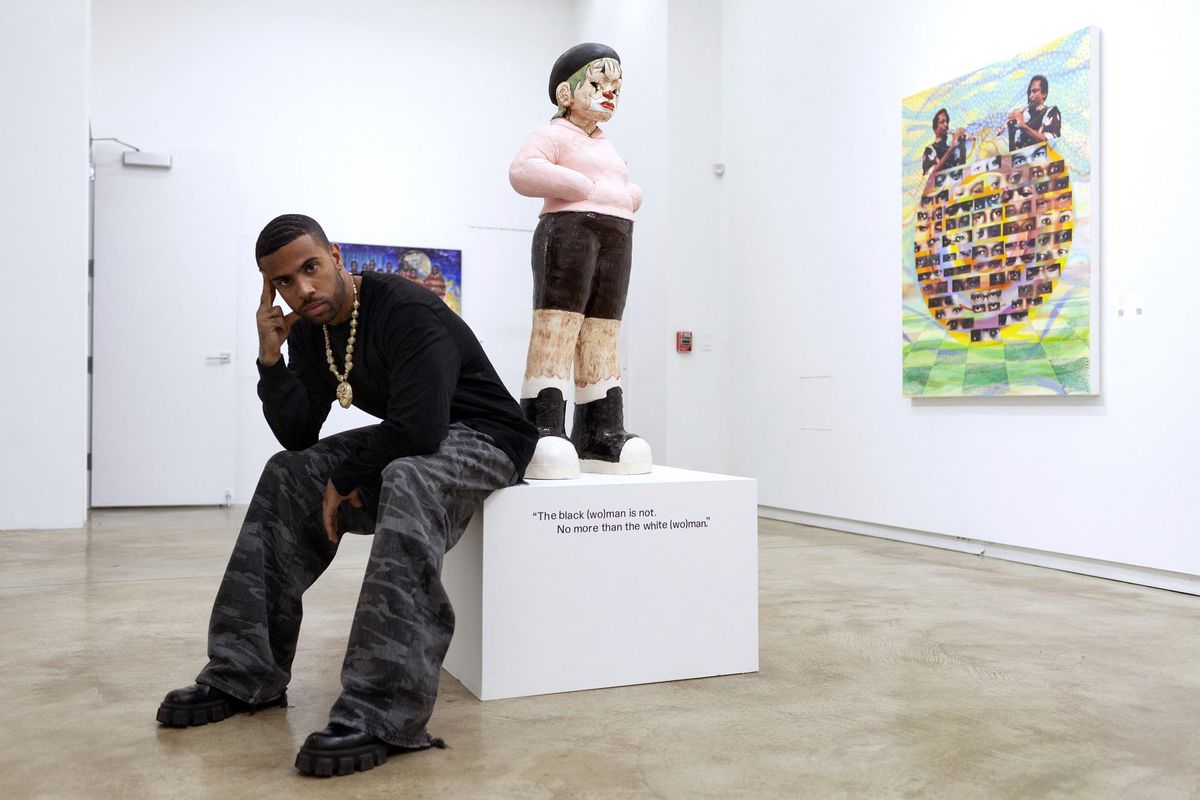Vic Mensa's 'SKIN + MASKS' Exhibit Puts a Spotlight on the Diaspora's Most Talented Artists
We spoke to rapper Vic Mensa about SKINS + MASKS, his group exhibition which features a number of talented artists from the diaspora.

With the curation of his debut exhibition, rapper Vic Mensa is imagining creativity, expression, and identity free of the white gaze.
Presented by the Kavi Gupta Gallery in Chicago, Mensa's SKINS + MASKS features art pieces by a collective of visual artists from the diaspora. The group exhibition, which opened last month, is inspired by Frantz Fanon’s 1952 book Black Skin, White Masks and centers on Black experiences with the goal of decolonizing Black art beyond the politics of visibility.
Mensa's father is from Ghana, and his roots are well represented in the exhibition. SKINS + MASKS features a number of rising artists from Ghana, including Accra-based talents like Foster Sakyiamah and Elizabeth Sekyiamah. (Elizabeth is the inaugural winner of the Judith-Ellen Prize, an annual prize dedicated to supporting emerging women artists within Africa and the Diaspora.)
Mensa first became aware of the work of the siblings when he visited the West African country earlier this year. He also met painters from other parts of the continent during his stay and started working with “so many people” off the spark of Ghana’s art movement.
“The art scene in Accra is electric. It’s magic. It’s on fire. That’s one of the things that has captivated me most about what I would say is the cultural revolution, upheaval going on in Ghana right now,” Mensa told OkayAfrica. “Some of the world’s premier painters and curators and art personalities are coming out of Ghana right now."
Mensa's exhibition also spotlights African artists from South Africa, the United States of America, and United Kingdom, with names like Dada Khanyisa, Joshua Donkor, Ndidi Emefiele, Andrea Coleman, and more taking center stage.
“I think our greatest tools of revolution are creativity,” Mensa said. “Our music, dance, art — those acts are revolutionary in and of themselves and a way many of us process our imaginations.”

Photo Credit: Brendan Jaccarino
The pieces by the artists explore understanding and expressing Black identity from the perspective of individual reality. One standout piece is Khanyisa’s ‘Wonder Where I’d Be Had I Not Placed Desirability at the Forefront of My Identity. The piece is a stunning and somewhat depressing sculptural painting that addresses individuals prioritizing how other people see them.
A popular rapper in the United States, Mensa is known for using his platform as an artist and activist to draw attention to social issues, especially those affecting marginalized communities. He also has a history of inspiring individuals to think critically about socio-political issues through the power of music and visual arts, while blending elements from his upbringing to the continent.
“If you look at the performances that were employed in the show, I combined a style of dance and music from the ghettos of Chicago called Footwork and juke music with the Djembe and like [a] futuristic African mask," Mensa said. "I think the drums themselves are a living breathing representation of an unbreakable African identity... Those intrinsic modes of communication and expression to me encapsulate and accomplish the goal of an unbreakable identity beyond only existing in proximity to whiteness.”
All proceeds from the ‘SKIN + MASKS’ exhibition will go to SaveMoneySaveLife, the Chicago-based non-profit organization Mensa founded. The non-profit will use the money to fund an arts program in Accra that will help create infrastructure and provide resources to emerging artists.
“There are so many talented artists in Ghana... and often, [what] separates access to industry and capital at the end of the day is resources and information,” Mensa said. “Same way where I live in Chicago, we as African people in America, in Ghana, and everywhere are just boundlessly talented, and wherever possible, I want to be able to provide resources and opportunities for those that don’t have [them.]”
In addition to everything he’s got going on, he is also “working on addressing [the] enormous divide and lack of collaboration between Black American artists and artists on the [African] continent.”
He mentioned the experiences of meeting fans of his music, and that of his friends, and the realization that they usually perform all over the world but hardly do so in Africa. Mensa's first performance in Ghana came only this year, despite the fact the West African country is his father's homeland.
Mensa says that he and other people around the world are “really trying” to create a global coalition that would encourage Black artists to regularly perform on the continent via “some type of festival.”
“I recognize that with privilege comes responsibility and also [an] opportunity,” Mensa said. “And so I am taking that on to help break down those misunderstandings between Black people on and off the [African] continent.”
- How Sudanese Art Is Fueling the Revolution - OkayAfrica ›
- The Yatreda Art Collective is Using Web3 to Honor Ethiopia's Past ... ›
- 7 African Curators You Should Know - OkayAfrica ›
- Interview: Chance the Rapper On Bringing a Festival to Ghana - OkayAfrica ›
- Vic Mensa is Planning to Bring Clean Water to Over 200k People in Ghana - OkayAfrica ›
- The Black Star Line Festival was a Triumphant Moment - OkayAfrica ›
- Vic Mensa Visits Father’s Homeland in Ghana - OkayAfrica ›
- Photo Series: Vic Mensa's Pilgrimage to Ghana - OkayAfrica ›

